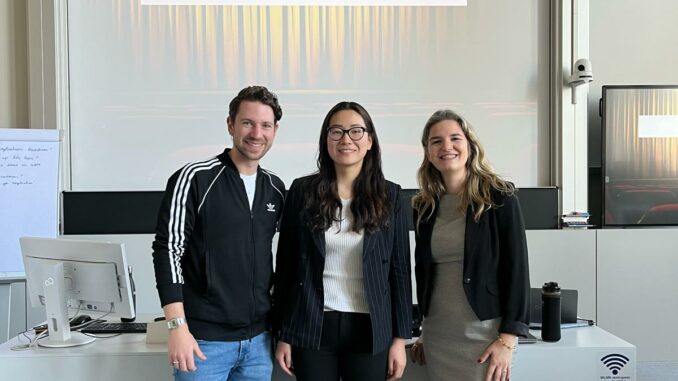
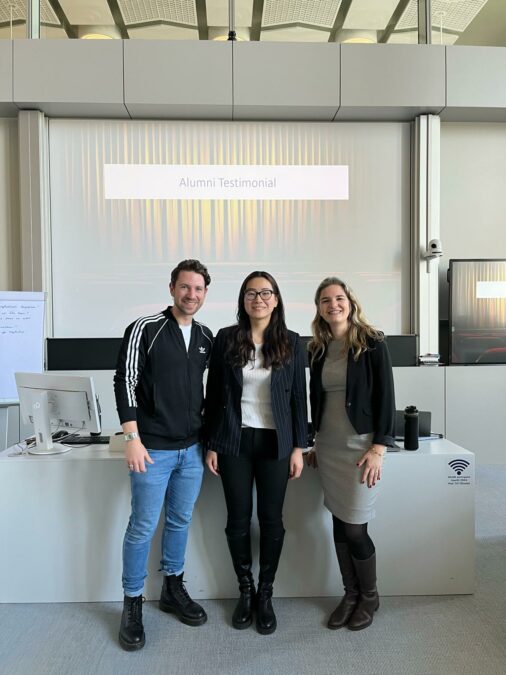
Hello, I’m Shen Mengwen, but you can call me Stella. In 2020, I graduated from the MIM program (now Master in Global Management, or MGM) at ESMT Berlin. Currently, I work as a Senior Associate at Bertelsmann Investments.
I earned my degree in International Economics and Trade from Renmin University of China in 2017. During my undergraduate years, I envisioned studying abroad, focusing on opportunities in English-speaking countries.
This led me to a semester-long exchange program at the University of British Columbia (UBC) in Canada and a research assistantship program at Harvard University. These experiences enriched my knowledge and global perspective, shaping my future endeavors.
Discovering Germany: A turning point
Up to this point, my academic journey had followed a somewhat conventional path. However, everything changed when I participated in the “Talent meets Bertelsmann” business innovation competition. As part of the winning team, I gained exceptional opportunities, including internships at Bertelsmann Asian Investment (BAI) and BIGO, a Bertelsmann-backed startup.
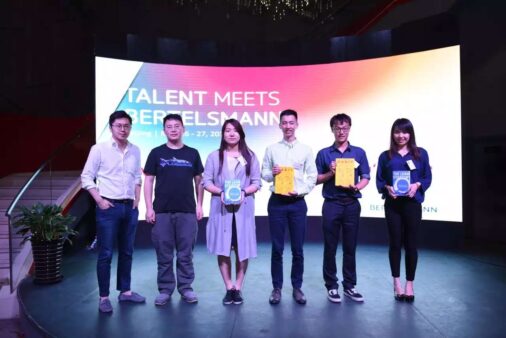
My time there was transformative, and I was honored as the Best Intern of Greater China 2016, giving me the opportunity to visit Bertelsmann’s headquarters. Germany left a profound impression on me with its rich history and vibrant culture.
Berlin, in particular, captivated me with its vibrant atmosphere and promising opportunities for development.
Before this, I had limited exposure to German companies. Through Bertelsmann, I discovered their strong commitment to nurturing talent. Beyond my internships, I participated in the international edition of Talent meets Bertelsmann in 2017, where my team won first place, earning us a trip to New York City to visit several Bertelsmann business units.
After starting my studies at ESMT Berlin, I continued my engagement with Bertelsmann through their Student Challenge Program, an annual event held at their HQ over Christmas.
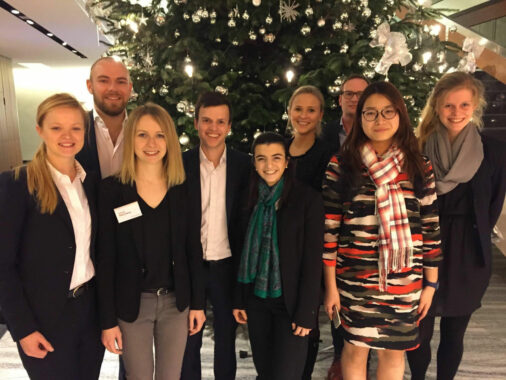
It provides insights into the company’s yearly achievements and future plans, and executives from various divisions share details about their responsibilities and ongoing projects, offering invaluable learning opportunities.
These experiences broadened my professional horizons and deepened my admiration for Bertelsmann’s global dedication to fostering talent and innovation.
Why I chose to study in Berlin
Studying abroad meant more than just expanding my horizons—it was a crucial step towards advancing my career in the financial industry, which I am passionate about.
When it came to choosing where to study, I carefully weighed the benefits and risks of studying in Germany versus in the United States.
1. Stable and supportive environment
Firstly, I considered the international political climate. Each of us is like a microcosm within the larger context of our times, influenced by global events. This is especially important if you’re planning to build a career abroad. Where you choose to study could be the starting point of your career journey, so opting for a stable and supportive environment can provide a solid foundation for your future career development.
2. More cost-effective
Secondly, I looked at the cost-effectiveness of studying in Germany and the US. In the US, a two-year master’s program would be incredibly expensive, with tuition fees and living expenses totaling nearly 1 million RMB (around €130k).
On the other hand, Germany was much more affordable. Many public universities waive tuition fees for international students, and even private business schools are cheaper than in the US. Plus, living costs in Germany are lower, and you can deduct your tuition as an educational expense on your taxes if you stay and work there after graduation.
3. Work and visa opportunities
Lastly, I thought about the talent policies. Visa, residency, and career development opportunities often depend on national talent shortages. In the US, these shortages are mostly in fields like computer science, which didn’t align with my interests. Germany had more favorable talent policies for my field, allowing me to pursue my passion without compromising my career goals.
Ultimately, I chose to study in Berlin at ESMT. This decision wasn’t just about academic prestige—it was a strategic move to immerse myself in an environment that supported my career goals and personal values.
The misconceptions and realities of studying in Germany
When I graduated, Germany was still seen as a relatively niche study destination. However, in recent years, I’ve noticed more students showing interest. Despite this, there are a few common misconceptions.
Misconception 1: High academic pressure and difficulty to graduate
This largely depends on the program you choose. For instance, business studies in Germany, especially those taught in English, are designed to be manageable.
At ESMT Berlin, the program curriculum is thoughtfully structured, with a “learn by doing” approach ensuring a gradual increase in complexity. It starts with foundational business courses, followed by a substantial internship, then specialized coursework and a Social Impact Project, and culminates in a thesis.
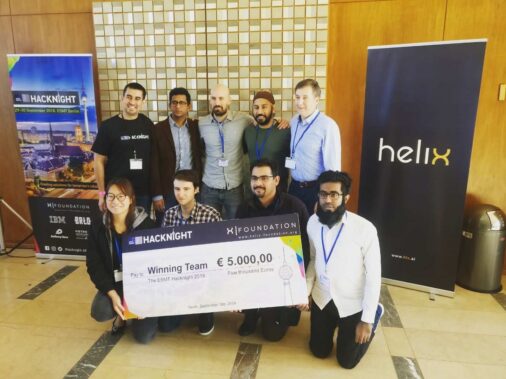
The small class sizes at ESMT Berlin allow the faculty to provide personalized support, helping students meet academic requirements without undue stress.
If you’re considering studying in Germany, gather information from various sources—school admissions offices, current students, alumni, and study forums to get a well-rounded perspective.
Misconception 2: You need to be fluent in German to find a job in Germany
Having lived in Germany for seven years, I can tell you that German companies highly value candidates with international backgrounds. Being an international student often opens doors.
Language requirements vary by industry and company. Many large corporations and startups in Germany prioritize English proficiency. While German skills are a plus, they’re not always essential. Finding a job in Germany is a personalized journey. Everyone’s circumstances and career goals are different, so don’t limit yourself based on perceived language barriers.
By understanding these insights and the evolving dynamics of studying and working in Germany, you can better prepare for a successful academic and professional experience abroad
My advice on finding a job in Germany
1. Explore opportunities with a gap year
At ESMT Berlin, I attended many activities held by the Career Development Centre and workshops hosted by various companies. I realized that many HR departments in Germany aren’t familiar with Chinese universities beyond well-known ones like Peking University and Tsinghua University.
This made me see the importance of gaining work experience in Germany, so I took a gap year. During my gap year, I interned at UniCredit’s Corporate & Investment Banking department in Munich and worked on a digitalization project at Procter & Gamble.
This allowed me to explore different career paths and gain valuable work experience in Germany.
2. Actively participate in career development activities
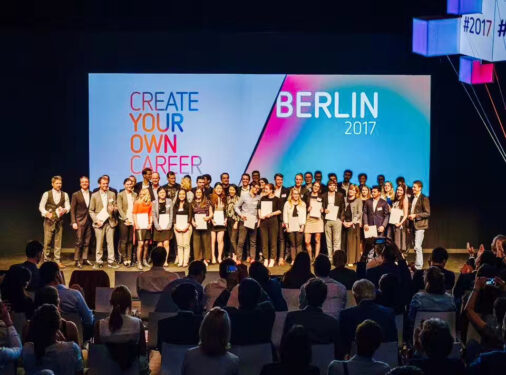
Many German companies organize career development activities. I attended workshops, career days, and other events held by financial companies at ESMT Berlin. These events are fantastic opportunities to get to know a company up close and talk directly with potential employers.
3. Take advantage of your school’s alumni network
LinkedIn is a great tool for reaching out to alumni in your target industry and company. I recommend keeping your messages short and clear about your background and needs.
ESMT Berlin frequently organizes alumni gatherings, and having a coffee chat with someone after meeting them in person has a much higher success rate.
4. And identify the most “helpful” alumni in your job search
In my experience, classmates or peers who are one or two years ahead of you are often the most helpful. They’re usually searching for or applying to positions that match your qualifications.
For example, I got my first job through a classmate’s recommendation. She referred me to a private equity and asset management firm after deciding to pursue a role in data analytics. Thanks to her, I got an interview and eventually joined the company.
Another classmate shared interview tips that helped me secure a job at Allianz Consulting. I’m incredibly grateful for the support from my classmates, which helped me land a good job in Germany in 2020, even amidst the pandemic.
5. Stay connected with your favorite companies
Bertelsmann introduced me to Germany and that led me to study my master’s degree at ESMT Berlin.
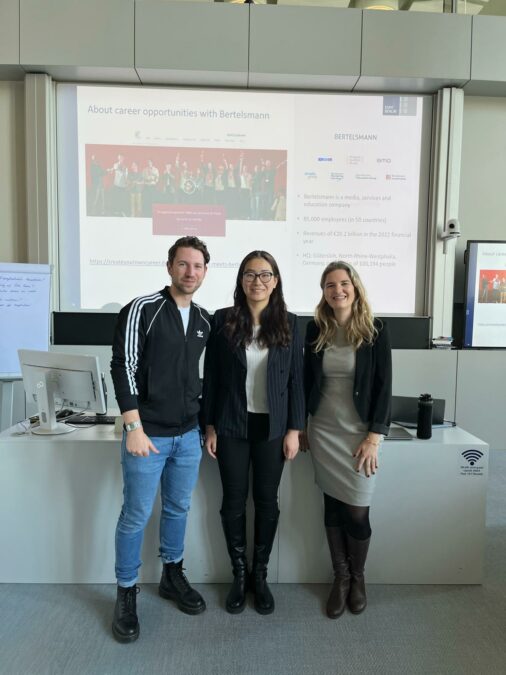
After graduating and starting full-time work, I still kept in touch with Bertelsmann for new career opportunities. In early 2023, their Talent Management department contacted me about a Senior Associate position at Bertelsmann Investment Group.
I went through the interviews and assessment day, and finally got the offer. I officially rejoined the Bertelsmann family last autumn.
In today’s world of geopolitical conflicts and de-globalization, we are in a time of uncertainty. But uncertainty isn’t necessarily a bad thing; it means that anything is possible.
We just have to keep exploring, accumulating resources, and always be ready for the next opportunity.
Get in touch with me:
I hope my sharing can help you. If you’re interested in learning more about ESMT Berlin and its master’s program, please feel free to connect with me on LinkedIn.
I’m happy to share more about my experience studying in Germany and answer any questions you might have.
